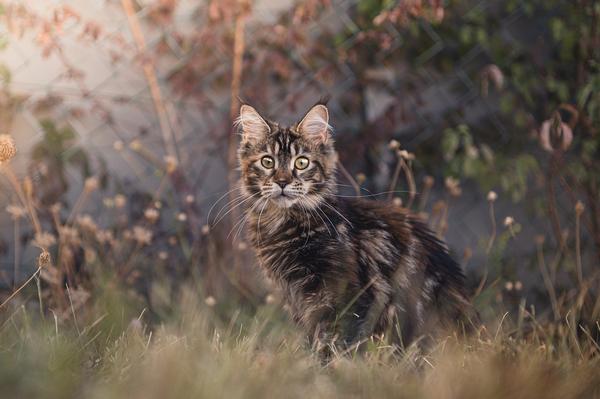Are Cats Scared of Thunder? (Understanding Their Fear)

Ever wondered why Fido goes running for cover at the first growl of thunder?
Are cats scared of thunder? 🐱
Can you blame them?
Imagine being tiny and helpless while the skies explode with noise and light.
You just want to help those poor kitties, don't you?
Well my friend, buckle up because we're about to dive into the mysterious world of feline thunder-phobia.
Let's unravel this purr-plexing question together, shall we?
How Do You Calm a Cat During a Thunderstorm?
When storms roll in, your cat can get scared and anxious.

Here's what you can do to help them:
- Give them gentle massages or stroke their fur to help them relax.
- Set up cozy hiding spots for them, like those igloo cat beds.
- Gradually expose them to storm sounds so they become less bothered by them.
- Find safe spots without windows or doors where they can feel secure and undisturbed.
- Leave an open carrier with a comfy blanket inside as their shelter.
- Stay calm and interact normally with your cat, letting them find comfort in their hiding spots without reinforcing their fear.
- Consider using anxiety remedies like swaddling, Bach Rescue Remedy, or Thundershirts.
- Give them natural remedies such as Storm Soother or Rescue Remedy to calm their nerves.
- Try out pheromone plug-ins like Comfort Zone with Feliway, which mimic calming signals cats release.
- If things get really tough, consult your vet who may recommend medication.
Each cat is different, so it might take some time to figure out what works best for yours! 😺
Main points I'll expand upon further down this article:
- Cats can become frightened by thunderstorms and loud noises.
- Seek refuge in quiet areas like beneath beds or cupboards.
- Anxious behaviors such as clinginess and restlessness are normal.
- Thunder and lightning can scare cats, especially if loud and close.
- Medication from a vet may be necessary for severe cases.
- Negative experiences and sensitivity to environmental changes can lead to phobias.
- Rushing winds during storms can make cats anxious.
- Thunderstorm phobia is uncommon, but can occur under unique circumstances.
- Thunderstorms cause extreme stress, prompting cats to hide.
- Cats tend to avoid thunderstorms rather than develop intense phobias.
Signs of Thunderstorm Fear/Phobia in Cats
When thunderstorms come, cats can get really scared. 😿
Here's how you can tell:
- They hide in quiet places like under beds or cupboards.
- They meow a lot when they're afraid of the thunder and lightning.
- Some cats become aggressive when they're scared during storms.
- They get restless and start pacing around, acting all anxious.
Loud noises and close thunder claps are especially scary for them.
Sometimes these experiences make cats develop an actual fear of thunderstorms.

In serious cases, a vet might even have to give them medication.
If cats have had bad experiences with loud noises before or if they're sensitive to changes around them, it could increase their fear of thunderstorms.
And when strong winds blow during storms, it makes them even more anxious.
Not all cats are scared of thunderstorms, but for some, it can be really stressful.
So, they end up hiding in corners or under furniture, just trying to feel safe.
Common Misconceptions About Cats and Thunderstorms
Cats and thunderstorms can be tricky together.
You may think that cats don't get as scared of storms like dogs, but they do have their own fears:
- It's easy to miss the subtle signs that show your cat is scared during a storm, so pay attention to their behavior.
- Some cat breeds actually have fur that is resistant to water, which comes in handy when it's raining.
- Cats might not be fans of thunder and lightning because they associate them with dampness and loud noises.
- But unlike dogs, cats will usually just stay away from thunderstorms instead of getting terrified.
- Big dogs with thick coats are more likely to have a strong fear of thunderstorms, while cats and small dogs don't tend to be affected as much.
- Contrary to what you might have heard, giving your cat comfort won't make their fear worse. Actually, offering reassurance and a safe space can help calm them down.
Cats have their own ways of dealing with thunderstorms.
Understanding what they need can be key to helping them stay relaxed when it's stormy outside.
...And when it comes to cats and thunderstorms, I understand the concern.
But don't worry, I have written a useful blog post that can help you understand why your cat may be hiding in the closet.
If you're curious to know more, make sure to check out my article that delves into the reasons behind this behavior: Why Is My Cat Hiding in the Closet.
Why Is My Cat So Afraid of Storms?
Cats' fear of thunderstorms can be influenced by external factors.
Previous traumatic experiences with loud noises or sudden environmental changes may contribute to their fear.

On top of that, just like in humans, weather variations can affect cats' moods.
So, when the storm hits, remember that your cat might get scared too because of past experiences and the weather changes. You have to create a safe and calming environment for your feline friend during thunderstorms, offering them comfort and reassurance.
And maybe, just maybe, you will both find solace in knowing that you're not alone in feeling the impact of those booming thunderclaps.
Cats' Ability to Sense Approaching Storms
Cats possess a natural ability to predict storms due to their heightened senses. They can detect drops in air pressure, notice changes in smells like ozone gas, and hear faint thunder. This allows them to remain more attuned to approaching thunderstorms than humans. Trust your cat's instincts.
Cats possess an inherent understanding, my dear associate.
Utilizing their heightened senses, felines have the ability to perceive even the most subtle alterations in their surroundings.
And can you believe it?
They possess the capability to predict storms.
These charming creatures possess powerful instincts that enable them to anticipate thunderstorms before us mere humans.
They react to warning signs indicating that the weather is about to deteriorate.
But how do they accomplish such a feat?
Well, cats excel at noticing drops in air pressure.
They can detect alterations in smells, such as the distinctive odor of ozone gas.
And those faint grumbles of thunder that may escape our ears?
Cats hear them clearly and distinctly.
When all these factors unite, it allows cats to remain more attuned to approaching thunderstorms compared to us.
Therefore, don't be taken aback if you observe your felid companion exhibiting signs of nervousness or agitation as stormy weather approaches.
They possess an innate sixth sense for these circumstances.
When the wind begins to blow?
They might instinctively detect an impending storm, leading to their unease.
Have faith in your cat's natural instincts, my friend.
They know precisely what they're doing.
And that wraps up today's article.
If you wish to read more of my useful articles, I recommend you check out some of these: Are Cats Protective of Their Kittens, Why Do Cats Lick Themselves After You Pet Them, Why Does My Cat Want Me to Watch Her Eat, Why Does My Cat Sit in the Bathtub, and Should I Adopt a Declawed Cat
Talk soon,
-Sarah Davis